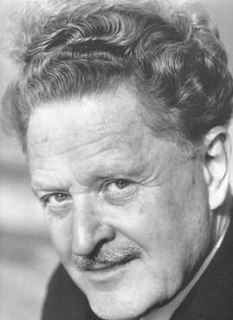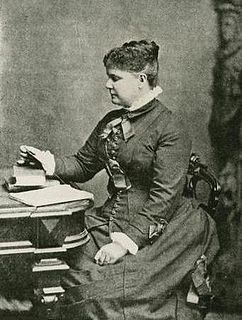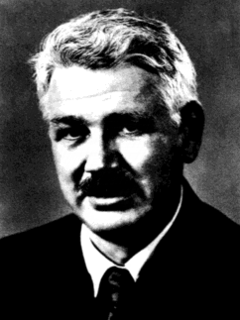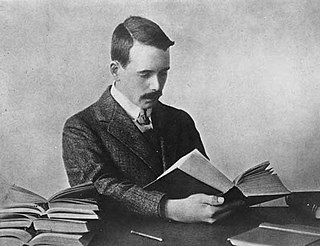Top 640 Hydrogen Atom Quotes & Sayings - Page 11
Explore popular Hydrogen Atom quotes.
Last updated on April 21, 2025.
Every atom you possess has almost certainly passed through several stars and been part of millions of organisms on its way to becoming you. We are each so atomically numberous and so vigorously recycled at death that a significant number of our atoms-up to a billion for each of us, it has been suggested-probably once belonged to Shakespeare. A billion more each came from Buddha and Genghis Khan and Beethoven, and any other historical figure you care to name.
I would rather be ashes than dust! I would rather that my spark should burn out in a brilliant blaze than it should be stifled by dry-rot. I would rather be a superb meteor, every atom of me in magnificent glow, than a sleepy and permanent planet. The function of man is to live, not to exist. I shall not waste my days trying to prolong them. I shall use my time.
This cell belongs to a brain, and it is my brain, the brain of me who is writing; and the cell in question, and within it the atom in question, is in charge of my writing, in a gigantic minuscule game which nobody has yet described. It is that which at this instant, issuing out of a labyrinthine tangle of yeses and nos, makes my hand run along a certain path on the paper, mark it with these volutes that are signs: a double snap, up and down, between two levels of energy, guides this hand of mine to impress on the paper this dot, here, this one.
I suppose there is something in all of us that harks back to the soil. When you come to think of it, what are picnics but outcroppings of instinct? No one really enjoys them or expects to enjoy them, but with the first warm days some prehistoric instinct takes us out into the woods, to fry potatoes over a strangling wood fire or spend the next week getting grass stains out of our clothes. It must be instinct; every atom of intelligence warns us to stay at home near the refrigerator.
There are over a million types of fish in the sea as there are flowers in all of the world's gardens. There are at least a million different types of rocks/minerals as there are species of birds or monkeys. To believe we are the only "intelligent beings" on this earth and beyond is ignorance. The possible configurations of lifeforms that could be created from a single atom are infinite. There are at least a billion people on this earth, and no two faces look the same. It is very arrogant to assume that we have seen all of God's miracles.
You know, sometimes I don't understand what's wrong with us. This is just about the most creative and imaginative country on earth—and yet sometimes we just don't seem to have the gumption to exploit our intellectual property. We split the atom, and now we have to get French or Korean scientists to help us build nuclear power stations. We perfected the finest cars on earth—and now Rolls-Royce is in the hands of the Germans. Whatever we invent, from the jet engine to the internet, we find that someone else carts it off and makes a killing from it elsewhere.
The images were gone, but Calvin was there, was with her, was part of her. She had moved beyond knowing him in sensory images to that place which is beyond images. Now she was kything Calvin, not red hair, or freckles, or eager blue eyes, or the glowing smile; nor was she hearing the deep voice with the occasional treble cracking; not any of this, but - Calvin. She was with Calvin, kything with every atom of her being, returning to him all the fortitude and endurance and hope which he had given her.
Does the engineer ever predict the acceleration of a given body from a knowledge of its mass and of the forces acting upon it? Of course. Does the chemist ever measure the mass of an atom by measuring its acceleration in a given field of force? Yes. Does the physicist ever determine the strength of a field by measuring the acceleration of a known mass in that field? Certainly. Why then, should any one of these roles be singled out as the role of Newton's second law of motion? The fact is that it has a variety of roles.
Welcome baby it's your turn to live they're laying for you chicken pox whooping cough smallpox malaria TB heart disease cancer and so on unemployment hunger and so on train wrecks bus accidents plane crashes on-the-job injuries earthquakes floods droughts and so on heartbreak alcoholism and so on nightsticks prisons doors and so on they're laying for you the atom bomb and so on welcome baby it's your turn to live they're laying for you socialism communism and so on.
Earlier this week ... scientists announced the completion of a task that once seemed unimaginable; and that is, the deciphering of the entire DNA sequence of the human genetic code. This amazing accomplishment is likely to affect the 21st century as profoundly as the invention of the computer or the splitting of the atom affected the 20th century. I believe that the 21st century will be the century of life sciences, and nothing makes that point more clearly than this momentous discovery. It will revolutionize medicine as we know it today.
The hypothesis of molecular vortices is defined to be that which assumes - that each atom of matter consists of a nucleus or central point enveloped by an elastic atmosphere, which is retained in its position by attractive forces, and that the elasticity due to heat arises from the centrifugal force of those atmospheres revolving or oscillating about their nuclei or central points.According to this hypothesis, quantity of heat is the vis viva of the molecular revolutions or oscillations.
Had we adopted non-violence as the weapon of the strong, because we realised that it was more effective than any other weapon, in fact the mightiest force in the world, we would have made use of its full potency and not have discarded it as soon as the fight against the British was over or we were in a position to wield conventional weapons. But as I have already said, we adopted it out of our helplessness. If we had the atom bomb, we would have used it against the British.
When carbon (C), Oxygen (o) and hydrogen (H) atoms bond in a certain way to form sugar, the resulting compound has a sweet taste. The sweetness resides neither in the C, nor in the O, nor in the H; it resides in the pattern that emerges from their interaction. It is an emergent property. Moreover, strictly speaking, is not a property of the chemical bonds. It is a sensory experience that arises when the sugar molecules interact with the chemistry of our taste buds, which in turns causes a set of neurons to fire in a certain way. The experience of sweetness emerges from that neural activity.
Of all the wonderful things in the wonderful universe of God, nothing seems to me more surprising than the planting of a seed in the blank earth and the result thereof. Take that Poppy seed, for instance: it lies in your palm, the merest atom of matter, hardly visible, a speck, a pin's point in bulk, but within it is imprisoned a spirit of beauty ineffable, which will break its bonds and emerge from the dark ground and blossom in a splendor so dazzling as to baffle all powers of description.
The truth is that there are no good men, or bad men,' he said. 'It is the deeds that have goodness or badness in them. There are good deeds, and bad deeds. Men are just men - it is what they do, or refuse to do, that links them to good and evil. The truth is that an instant of real love, in the heart of anyone - the noblest man alive or the most wicked - has the whole purpose and process and meaning of life within the lotus-folds of its passion. The truth is that we are all, every one of us, every atom, every galaxy, and every particle of matter in the universe, moving toward God.
One often feels as though something had happened before, I remember. It comes quite close to you and stands there and you know it was just this way once before, exactly so; for an instant you almost know how it must go on, but then it disappears as you try to lay hold of it like smoke or a dead memory. "We could never remember, Isabelle," I say. "It's like the rain. That has also become one, out of two gasses, oxygen and hydrogen, which no longer remember they were once gasses. Now they are only rain and have no memory of an earlier time.
What is the most rigorous law of our being? Growth. No smallest atom of our moral, mental, or physical structure can stand still a year. It grows--it must grow smaller or larger, better or worse--it cannot stand still. In other words, we change--and must change, constantly, and keep on changing as long as we live. What, then, is the true Gospel of consistency? Change. Who is the really consistent man? The man who changes. Since change is the law of his being, he cannot be consistent if he's stuck in a rut.
It is the retention by twentieth-century, Atom-Age men of the Neolithic point of view that says: You stay in your village and I will stay in mine. If your sheep eat our grass we will kill you, or we may kill you anyhow to get all the grass for our own sheep. Anyone who tries to make us change our ways is a witch and we will kill him. Keep out of our village.
In the years since man unlocked the power stored up within the atom, the world has made progress, halting, but effective, toward bringing that power under human control. The challenge may be our salvation. As we begin to master the destructive potentialities of modern science, we move toward a new era in which science can fulfill its creative promise and help bring into existence the happiest society the world has ever known.
The incomplete knowledge of a system must be an essential part of every formulation in quantum theory. Quantum theoretical laws must be of a statistical kind. To give an example: we know that the radium atom emits alpha-radiation. Quantum theory can give us an indication of the probability that the alpha-particle will leave the nucleus in unit time, but it cannot predict at what precise point in time the emission will occur, for this is uncertain in principle.
Peace is never long preserved by weight of metal or by an armament race. Peace can be made tranquil and secure only by understanding and agreement fortified by sanctions. We must embrace international cooperation or international disintegration. Science has taught us how to put the atom to work. But to make it work for good instead of for evil lies in the domain dealing with the principles of human dignity. We are now facing a problem more of ethics than of physics.
In our time, political speech and writing are largely the defense of the indefensible. Things like the continuance of British rule in India, the Russian purges and deportations, the dropping of the atom bombs on Japan, can indeed be defended, but only by arguments which are too brutal for most people to face, and which do not square with the professed aims of the political parties. Thus political language has to consist largely of euphemism, question-begging and sheer cloudy vagueness.
I am not surprised that men who put their trust in an atom should fail in their slightest attempts to plumb truth, that with such limited vision they cannot see beyond the sky and the stars to God Himself; that since they cannot discern the superiority of what is spiritual or the dignity of man's soul, they are even more unaware how hard it is to satisfy, how the whole earth is unworthy of it, how urgently it needs a supremely perfect being, who is God, and how indispensable to it is a religion which will lead it towards God and provide a sure pledge of Him.
I started off doing indie comics that I wrote and drew myself. I was doing those for ten years before I started to work for DC. The first book that I wrote for DC was for another artist. I did some backups in 'Adventure Comics' years ago starring The Atom. That's the first time that I ever wrote for another artist.
There have been times when the church seemed afraid, but she is no longer. Analyze, dissect, use your microscope or your spectrum till the last atom of matter is reached; reflect and refine till the last element of thought is made clear; the church now knows with the certainty of science what she once knew only by the certainty of faith, that you will find enthroned behind all thought and matter only one central idea--that idea which the church has never ceased to embody--I AM!
I leave Sisyphus at the foot of the mountain. One always finds one's burden again. But Sisyphus teaches the higher fidelity that negates the gods and raises rocks. He too concludes that all is well. This universe henceforth without a master seems to him neither sterile nor futile. Each atom of that stone, each mineral flake of that night-filled mountain, in itself, forms a world. The struggle itself toward the heights is enough to fill a man's heart. One must imagine Sisyphus happy.
It is to be remembered that all art is magical in origin - music, sculpture, writing, painting - and by magical I mean intended to produce very definite results. Paintings were originally formulae to make what is painted happen. Art is not an end in itself, any more than Einstein's matter-into-energy formulae is an end in itself. Like all formulae, art was originally FUNCTIONAL, intended to make things happen, the way an atom bomb happens from Einstein's formulae.
Sometimes the public says, 'What's in it for Numero Uno? Am I going to get better television reception? Am I going to get better Internet reception?' Well, in some sense, yeah. ... All the wonders of quantum physics were learned basically from looking at atom-smasher technology. ... But let me let you in on a secret: We physicists are not driven to do this because of better color television. ... That's a spin-off. We do this because we want to understand our role and our place in the universe.
When enough electrons within an atom get aligned and a critical mass is reached - as soon as you hit that hundredth monkey, as soon as you hit the one - you have phase transition, and all the rest of the electrons automatically make the change. My mission - what I teach and what I believe in - is that you just get yourself aligned with God-consciousness. If we teach enough people to do it - if enough of us ultimately get there - then we'll start electing leaders with this kind of consciousness. We'll start seeing kinds of shifts taking their place.
Atoms are weird stuff, behaving like active agents rather than inert substances. They make unpredictable choices between alternative possibilities according to the laws of quantum mechanics. It appears that mind, as manifested by the capacity to make choices, is to some extent inherent in every atom. The universe is also weird, with its laws of nature that make it hospitable to the growth of mind. I do not make any clear distinction between mind and God. God is what mind becomes when it passes beyond the scale of our comprehension.
Ayurveda is the science of life and it has a very basic, simple kind of approach, which is that we are part of the universe and the universe is intelligent and the human body is part of the cosmic body, and the human mind is part of the cosmic mind, and the atom and the universe are exactly the same thing, but with different form, and the more we are in touch with this deeper reality, from where everything comes, the more we will be able to heal ourselves and at the same time heal our planet.
The whole subject of the X rays is opening out wonderfully, Bragg has of course got in ahead of us, and so the credit all belongs to him, but that does not make it less interesting. We find that an X ray bulb with a platinum target gives out a sharp line spectrum of five wavelengths which the crystal separates out as if it were a diffraction grating. In this way one can get pure monochromatic X rays. Tomorrow we search for the spectra of other elements. There is here a whole new branch of spectroscopy, which is sure to tell one much about the nature of an atom.
Christianity does not want us to reduce by one atom the hatred we feel for cruelty and treachery. We ought to hate them. Not one word of what we have said about them needs to be unsaid. But it does want us to hate them in the same way in which we hate things in ourselves: being sorry that the man should have done such things, and hoping, if it is anyway possible, that somehow, sometime, somewhere he can be cured and made human again.
Like most young physicists, when I was a kid enraptured with physics, I thought, "Everything can be explained by the theory of the atom!" But as I've gotten older, and I look at the world, I think there's a lot of ways in which that kind of building up from the smallest building blocks doesn't actually account for the world. As I've gotten older, I've also become sensitive to the ways - to all that is not amenable to explanation. Things that, even if you had an explanation, what good would it be?
Bliss - a-second-by-second joy and gratitude at the gift of being alive, conscious - lies on the other side of crushing, crushing boredom. Pay close attention to the most tedious thing you can find (Tax Returns, Televised Golf) and, in waves, a boredom like you’ve never known will wash over you and just about kill you. Ride these out, and it’s like stepping from black and white into color. Like water after days in the desert. Instant bliss in every atom.
In this age of space flight, when we use the modern tools of science to advance into new regions of human activity, the Bible... remains in every way an up-to-date book. Our knowledge and use of the laws of nature that enable us to fly to the Moon also enable us to destroy our home planet with the atom bomb. Science itself does not address the question whether we should use the power at our disposal for good or for evil. The guidelines of what we ought to do are furnished in the moral law of God.
He always reminded us that every atom in our bodies was once part of a distant star that had exploded. He talked about how evolution moves from simplicity toward complexity, and how human intelligence is the highest known expression of evolution. I remember him telling me that a frog's brain is much more complex than a star. He saw human consciousness as the first neuron of the universe coming to life and awareness. A spark in the darkness, waiting to spread to fire.
Quantum events have a way of just happening, without any cause, as when a radioactive atom decays at a random time. Even the quantum vacuum is not an inert void, but is boiling with quantum fluctuations. In our macroscopic world, we are used to energy conservation, but in the quantum realm this holds only on average. Energy fluctuations out of nothing create short-lived particle-antiparticle pairs, which is why the vacuum is not emptiness but a sea of transient particles. An uncaused beginning, even out of nothing, for spacetime is no great leap of the imagination.
No good act performed in the world ever dies. Science tells us that no atom of matter can ever be destroyed, that no force once started ever ends; it merely passes through a multiplicity of ever-changing phases. Every good deed done to others is a great force that starts an unending pulsation through time and eternity. We may not know it, we may never hear a word of gratitude or recognition, but it will all come back to us in some form as naturally, as perfectly, as inevitably, . . . as echo answers to sound.
A hundred years ago, Auguste Compte, ... a great philosopher, said that humans will never be able to visit the stars, that we will never know what stars are made out of, that that's the one thing that science will never ever understand, because they're so far away. And then, just a few years later, scientists took starlight, ran it through a prism, looked at the rainbow coming from the starlight, and said: "Hydrogen!" Just a few years after this very rational, very reasonable, very scientific prediction was made, that we'll never know what stars are made of.






































